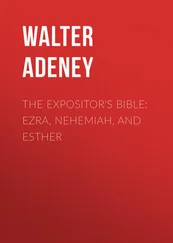Robert Alexander Watson - The Expositor's Bible - Judges and Ruth
Здесь есть возможность читать онлайн «Robert Alexander Watson - The Expositor's Bible - Judges and Ruth» — ознакомительный отрывок электронной книги совершенно бесплатно, а после прочтения отрывка купить полную версию. В некоторых случаях можно слушать аудио, скачать через торрент в формате fb2 и присутствует краткое содержание. Издательство: Иностранный паблик, Жанр: foreign_prose, foreign_religion, Философия, foreign_psychology, foreign_antique, на английском языке. Описание произведения, (предисловие) а так же отзывы посетителей доступны на портале библиотеки ЛибКат.
- Название:The Expositor's Bible: Judges and Ruth
- Автор:
- Издательство:Иностранный паблик
- Жанр:
- Год:неизвестен
- ISBN:нет данных
- Рейтинг книги:5 / 5. Голосов: 1
-
Избранное:Добавить в избранное
- Отзывы:
-
Ваша оценка:
- 100
- 1
- 2
- 3
- 4
- 5
The Expositor's Bible: Judges and Ruth: краткое содержание, описание и аннотация
Предлагаем к чтению аннотацию, описание, краткое содержание или предисловие (зависит от того, что написал сам автор книги «The Expositor's Bible: Judges and Ruth»). Если вы не нашли необходимую информацию о книге — напишите в комментариях, мы постараемся отыскать её.
The Expositor's Bible: Judges and Ruth — читать онлайн ознакомительный отрывок
Ниже представлен текст книги, разбитый по страницам. Система сохранения места последней прочитанной страницы, позволяет с удобством читать онлайн бесплатно книгу «The Expositor's Bible: Judges and Ruth», без необходимости каждый раз заново искать на чём Вы остановились. Поставьте закладку, и сможете в любой момент перейти на страницу, на которой закончили чтение.
Интервал:
Закладка:
How Jewish, we may be disposed to say. May we not also say, How thoroughly British? The virtue of Achsah, is it not the virtue of a true British wife? To urge her husband on and up in the social scale, to aid him in every point of the contest for wealth and place, to raise him and rise with him, what can be more admirable? Are there opportunities of gaining the favour of the powerful who have offices to give, the liking of the wealthy who have fortunes to bequeath? The managing wife will use these opportunities with address and courage. She will light off her ass and bow humbly before a flattered great man to whom she prefers a request. She can fit her words to the occasion and her smiles to the end in view. It is a poor spirit that is content with anything short of all that may be had: thus in brief she might express her principle of duty. And so in ten thousand homes there is no question whether marriage is a failure. It has succeeded. There is a combination of man's strength and woman's wit for the great end of "getting on." And in ten thousand others there is no thought more constantly present to the minds of husband and wife than that marriage is a failure. For restless ingenuity and many schemes have yielded nothing. The husband has been too slow or too honest, and the wife has been foiled; or, on the other hand, the woman has not seconded the man, has not risen with him. She has kept him down by her failings; or she is the same simple-minded, homely person he wedded long ago, no fit mate, of course, for one who is the companion of magnates and rulers. Well may those who long for a reformation begin by seeking a return to simplicity of life and the relish for other kinds of distinction than lavish outlay and social notoriety can give. Until married ambition is fed and hallowed at the Christian altar there will be the same failures we see now, and the same successes which are worse than "failures."
For a moment the history gives us a glimpse of another domestic settlement. "The children of the Kenite went up from the City of Palm Trees with the children of Judah," and found a place of abode on the southern fringe of Simeon's territory, and there they seem to have gradually mingled with the tent-dwellers of the desert. By-and-by we shall find one Heber the Kenite in a different part of the land, near the Sea of Galilee, still in touch with the Israelites to some extent, while his people are scattered. Heber may have felt the power of Israel's mission and career and judged it wise to separate from those who had no interest in the tribes of Jehovah. The Kenites of the south appear in the history like men upon a raft, once borne near shore, who fail to seize the hour of deliverance and are carried away again to the wastes of sea. They are part of the drifting population that surrounds the Hebrew church, type of the drifting multitude who in the nomadism of modern society are for a time seen in our Christian assemblies, then pass away to mingle with the careless. An innate restlessness and a want of serious purpose mark the class. To settle these wanderers in orderly religious life seems almost impossible; we can perhaps only expect to sow among them seeds of good, and to make them feel a Divine presence restraining from evil. The assertion of personal independence in our day has no doubt much to do with impatience of church bonds and habits of worship; and it must not be forgotten that this is a phase of growing life needing forbearance no less than firm example.
Zephath was the next fortress against which Judah and Simeon directed their arms. When the tribes were in the desert on their long and difficult march they attempted first to enter Canaan from the south, and actually reached the neighbourhood of this town. But, as we read in the Book of Numbers, Arad the king of Zephath fought against them and took some of them prisoners. The defeat appears to have been serious, for, arrested and disheartened by it, Israel turned southward again, and after a long détour reached Canaan another way. In the passage in Numbers the overthrow of Zephath is described by anticipation; in Judges we have the account in its proper historical place. The people whom Arad ruled were, we may suppose, an Edomite clan living partly by merchandise, mainly by foray, practised marauders, with difficulty guarded against, who having taken their prey disappeared swiftly amongst the hills.
In the world of thought and feeling there are many Zephaths, whence quick outset is often made upon the faith and hope of men. We are pressing towards some end, mastering difficulties, contending with open and known enemies. Only a little way remains before us. But invisible among the intricacies of experience is this lurking foe who suddenly falls upon us. It is a settlement in the faith of God we seek. The onset is of doubts we had not imagined, doubts of inspiration, of immortality, of the incarnation, truths the most vital. We are repulsed, broken, disheartened. There remains a new wilderness journey till we reach by the way of Moab the fords of our Jordan and the land of our inheritance. Yet there is a way, sure and appointed. The baffled, wounded soul is never to despair. And when at length the settlement of faith is won, the Zephath of doubt may be assailed from the other side, assailed successfully and taken. The experience of some poor victims of what is oddly called philosophic doubt need dismay no one. For the resolute seeker after God there is always a victory, which in the end may prove so easy, so complete, as to amaze him. The captured Zephath is not destroyed nor abandoned, but is held as a fortress of faith. It becomes Hormah—the Consecrated.
Victories were gained by Judah in the land of the Philistines, partial victories, the results of which were not kept. Gaza, Ashkelon, Ekron were occupied for a time; but Philistine force and doggedness recovered, apparently in a few years, the captured towns. Wherever they had their origin, these Philistines were a strong and stubborn race, and so different from the Israelites in habit and language that they never freely mingled nor even lived peaceably with the tribes. At this time they were probably forming their settlements on the Mediterranean seaboard, and were scarcely able to resist the men of Judah. But ship after ship from over sea, perhaps from Crete, brought new colonists; and during the whole period till the Captivity they were a thorn in the side of the Hebrews. Beside these, there were other dwellers in the lowlands, who were equipped in a way that made it difficult to meet them. The most vehement sally of men on foot could not break the line of iron chariots, thundering over the plain. It was in the hill districts that the tribes gained their surest footing,—a singular fact, for mountain people are usually hardest to defeat and dispossess; and we take it as a sign of remarkable vigour that the invaders so soon occupied the heights.
Here the spiritual parallel is instructive. Conversion, it may be said, carries the soul with a rush to the high ground of faith. The Great Leader has gone before preparing the way. We climb rapidly to fortresses from which the enemy has fled, and it would seem that victory is complete. But the Christian life is a constant alternation between the joy of the conquered height and the stern battles of the foe-infested plain. Worldly custom and sensuous desire, greed and envy and base appetite have their cities and chariots in the low ground of being. So long as one of them remains the victory of faith is unfinished, insecure. Piety that believes itself delivered once for all from conflict is ever on the verge of disaster. The peace and joy men cherish, while as yet the earthly nature is unsubdued, the very citadels of it unreconnoitred, are visionary and relaxing. For the soul and for society the only salvation lies in mortal combat—life-long, age-long combat with the earthly and the false. Nooks enough may be found among the hills, pleasant and calm, from which the low ground cannot be seen, where the roll of the iron chariots is scarcely heard. It may seem to imperil all if we descend from these retreats. But when we have gained strength in the mountain air it is for the battle down below, it is that we may advance the lines of redeemed life and gain new bases for sacred enterprise.
Читать дальшеИнтервал:
Закладка:
Похожие книги на «The Expositor's Bible: Judges and Ruth»
Представляем Вашему вниманию похожие книги на «The Expositor's Bible: Judges and Ruth» списком для выбора. Мы отобрали схожую по названию и смыслу литературу в надежде предоставить читателям больше вариантов отыскать новые, интересные, ещё непрочитанные произведения.
Обсуждение, отзывы о книге «The Expositor's Bible: Judges and Ruth» и просто собственные мнения читателей. Оставьте ваши комментарии, напишите, что Вы думаете о произведении, его смысле или главных героях. Укажите что конкретно понравилось, а что нет, и почему Вы так считаете.












